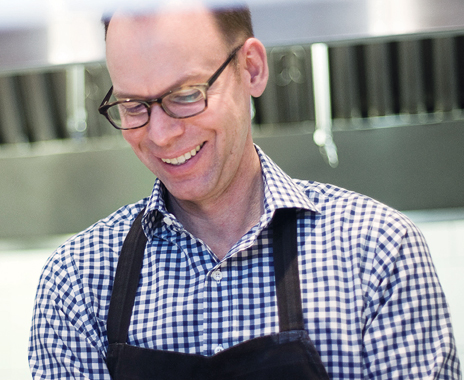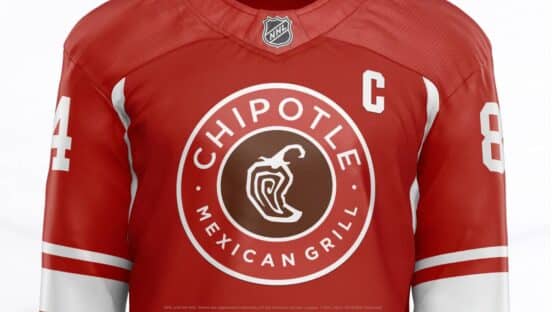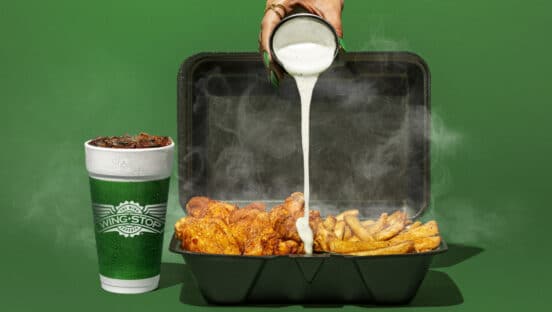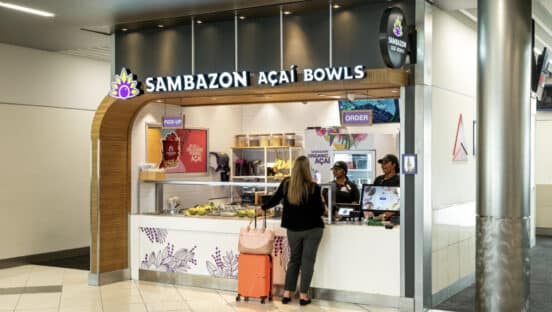When classically trained chef Steve Ells opened his first Chipotle in Denver in 1993, he probably wouldn’t have believed that the brand was set up for such enormous success. After all, he was executing a high level of fast food that was nearly unheard of, had modest financing to get his business off its feet, and had little, if any, direct business experience.
But fast-forward 22 years, and that very same brand is one of the most successful companies in the restaurant industry. Now operating nearly 1,800 units, Chipotle has flourished not just in terms of scale, but financially, too. Last year its revenue increased by 27.8 percent to $4.11 billion, with sales increases of 17 percent at stores open at least one year, despite the fact that the company had implemented some higher menu prices.
These days every other fast-casual operator wants to know: How does Chipotle do it? While the answer isn’t simple, the root of its success goes beyond healthy stock prices and impressive same-store sales.
Chipotle spent the last two-plus decades creating, developing, and reinforcing what it calls its “food culture,” and that culture has given it incredible leverage in the restaurant
space. Finding the best possible ingredients and preparing food fresh in the stores using classic cooking techniques, says Chris Arnold, communications director at Chipotle, is at the core of how Chipotle has elevated the limited-service restaurant experience. Since the beginning, it’s been a champion of free-range, humanely raised, hormone- and antibiotic-free proteins, a commitment it undertook in 2000 when it began serving naturally raised pork in all of its units. Today, each of the brand’s proteins come from pasture-raised animals—and not just because it’s more humane or eco-friendly.
“We think food that’s raised that way tastes better,” Arnold says. “For example, when you raise pigs outside or with access to the outdoors, they develop more back fat to protect them from the elements, and that creates more marbled, moister, more flavorful pork.”
And while Arnold admits that only a small percentage of consumers visit the restaurant for this reason alone, it has become a defining characteristic that sets it apart from other players in the industry. It’s the same with Chipotle’s commitment to the local food movement, which resulted in the brand purchasing more than 20 million pounds of locally grown produce in 2014 alone. Such a strong commitment to better ingredients gave Chipotle the confidence to attach its trademark tagline, “Food With Integrity.”
“They walk the walk. And in today’s world, where there are no secrets anymore, you’ve got to walk the walk,” says Dennis Lombardi, executive vice president of foodservice strategies at consulting firm WD Partners. “Talking the talk isn’t sufficient.”
One recent example of its penchant for walking the walk: In January, Chipotle stopped serving carnitas at nearly one-third of its stores after discovering that one of its pork suppliers violated the brand’s standards. Considering the popularity of the menu item—6–7 percent of Chipotle’s entrée orders include carnitas—significant consumer backlash could have followed. But Arnold says the brand saw an overwhelmingly positive response from customers.
“While that was a decision that we felt was the right one, we weren’t at all sure how customers would respond,” he says. “The response was, ‘Kudos to Chipotle for standing on principle.’”
Not only was the carnitas pull a sign of the brand’s commitment to its values, but it also proved just how big a role every item on its menu plays. After all, with just five proteins and four entrées—burritos, burrito bowls, tacos, and salads—any missing piece of the menu puzzle can leave a gaping hole. And though some operators would balk at the idea of having only 135 SKUs in the restaurant, Arnold says, Chipotle’s limited scope of ingredients helps preserve the brand’s food integrity.
“Because customers can choose how those things are put together, there are more than 65,000 different combinations,” Arnold says. “So within this seemingly limited menu, there’s a ton of variety.”
When it comes to menu development, product rollouts are few and far between, with the brand adding only one truly new menu item in its history: a tofu product, sofritas, in 2013. However, Arnold says many of its menu innovations have been in finding fresher, better ingredients and improving cooking techniques to make its food taste better, rather than in rolling out new items altogether.
“Chipotle’s been criticized for not innovating, but the fact that … they’ve just kept to a simple menu is something their customers appreciate,” says Darren Tristano, executive vice president at Technomic. “It differentiates them and it helps them to really be that place for those key items.”
Another differentiating factor: To this day, each of its units remains company-owned. This means the brand can make decisions and effectively implement them without having to worry about their effect on franchisees, Arnold says. “Much of what we do as a business flies in the face of conventional fast-food wisdom,” he says. “We spend more on ingredients, not less. Our food costs in the most recent quarter were 35 percent, which is really quite high in the category. So getting franchisees on board with that can be a difficult thing.”
Owning all of its units also allows Chipotle to maintain control over the variables it thinks matter most and deliver the best dining experience possible—an experience that includes quick speed of service, high order accuracy and efficiency, and complete transparency.
“You can smell food being cooked, you can see food being cooked, you can often hear your chicken or steak on the grill,” Arnold says. “You’re greeted by people who are really friendly and genuine. There’s not a contrived, scripted service model. People are really supposed to be themselves. It’s a very transparent experience, and all of that really seems to resonate with people.”
This kind of experience creates what Noah Fleming, author of Evergreen: Cultivate the Enduring Customer Loyalty That Keeps Your Business Thriving, calls true loyalty: loyalty based on a love of the brand rather than a rewards card. “Loyalty is rarely earned or rarely created because of the ‘stuff’—in this case, the food. It’s everything else,” Fleming says. “It’s being part of that bigger picture, buying into the story of the high-quality food and the way you’re treated when you go in.”
Loyalty also stems from Chipotle’s ability to understand and tap into its Millennial customer base through outside-the-box marketing techniques. As a whole, Chipotle is known for differing from the big brands in limited service, steering clear of Super Bowl ads, TV spots, and other forms of mass media. Instead, it focuses more on top-of-mind local advertising, billboards, radio, and word of mouth.
[pagebreak]
But that doesn’t mean Chipotle has steered clear of big media buys entirely. In 2011, the brand unveiled its first-ever national TV ad, “Back to the Start,” at the Grammys, then followed up in 2013 with an animated film called “Scarecrow” and a four-episode original comedy series, “Farmed and Dangerous,” in 2014. These interactive, engaging campaigns have allowed Chipotle to use innovative marketing methods to effectively tell its “Food With Integrity” story.
In recent months, the brand has also connected with guests through its “Cultivating Thought” program. Rather than using its packaging to promote products or campaigns, Chipotle has employed “Cultivating Thought” to publish original essays from influential writers and thought leaders—think Malcolm Gladwell and comedian Aziz Ansari—on its cups and bags.
In addition, this year the company is celebrating the five-year anniversary of its Cultivate Festival, an annual multi-city event that encourages attendees to think and talk about food issues while enjoying cooking demonstrations, special menus, music from popular bands, and interactive experiences.
“Those are proving to be really powerful ways to connect with customers,” Arnold says of the Cultivate Festival events. “The whole idea is to engage with people through entertainment, but to educate them or to make them curious about food issues while they’re there.”
Just as the brand has worked for more than two decades to refine its food culture, customer experience, and community building, it has focused heavily on improving itself from within and making sure all team members live and breathe its core values—a mission made far easier thanks to leadership consistency, with Ells acting as CEO for the last 22 years. The company has also undergone some leadership evolution. In 2006, it recruited Monty Moran as co-CEO. He’s become the architect of the “people culture” Chipotle has become famous for over the last decade.
That people culture starts with an emphasis on recruiting the best performing individuals it can find and developing them to play bigger roles within the unit and the organization at large, Arnold says.
“They are open to bringing in very entry-level people with the right temperament and the right personality when restaurants have often focused on those individuals who are more experienced,” Tristano says. “It’s a way to bring in more interesting personalities.”
In fact, Chipotle focuses so much on personality that Arnold says the brand runs recruitment ads declaring, “No experience preferred.” It also hires for a set of 13 characteristics—including hospitality and infectious enthusiasm—that “as an adult, we don’t think you can be taught. You either have them or you don’t,” Arnold says.
After hiring its team members, Chipotle provides a career path for them by developing a “crew ladder” to help advance and develop each employee. “All of our people know where they stand at any given time and what they need to do to move to the next position,” Arnold says. “It’s an area where there is constant training and development, and where people have really extraordinary opportunities.”
Its emphasis on promoting within is so pronounced that 95 percent of its hourly managers were promoted from within its ranks, as well as 85 percent of its salaried managers, known internally as “restaurateurs.”
Launched in 2006, Chipotle’s Restaurateur Program identifies outstanding restaurant managers and helps develop them into strong team leaders. Once interviewed and handpicked by Moran and Ells, restaurateurs earn a salary—often reaching the six-figure mark—as well as a bonus for each crewmember they help develop into general managers.
“What makes a restaurateur as opposed to a general manager is that a restaurateur is a general manager with a demonstrated ability to develop the people around them,” Arnold says. “It provides rewards for the outcomes that we think are most important—namely, developing people and making the team around you a lot better.”
As the brand continues to grow at a quick pace, so does the difficulty of recruiting and developing the kind of people it wants to join its ranks. Arnold says it’s a challenge the brand keeps finding new ways to overcome. “Chipotle has set a very lofty mission for itself to change the way people eat and think about fast food, and we knew that was going to be a really tenacious goal,” he says.
People aside, the brand also expects to face challenges with its food culture— particularly with sourcing—as it moves into the future. “We ran into that with pork, and there isn’t any slack in the system,” Arnold says. “When we suspended a supplier, the result was that there wasn’t enough. We’re looking at a lot of ways to expand that supply, but that will continue to be a challenge.”
Growing competition is an ever-present obstacle for Chipotle, too. “The things they’re known for could either be hijacked or could easily be adopted in a better, more memorable, more meaningful way,” says Kevin Meany, CEO of BFG Communications, a full-service marketing agency.
“They’re obviously successful, they’re positioned well, they’ve got a great story,” he adds. “But when you’re that strong, that’s when you really have to be careful and look out, because everybody is looking at them and trying to emulate them or find a better way.”







